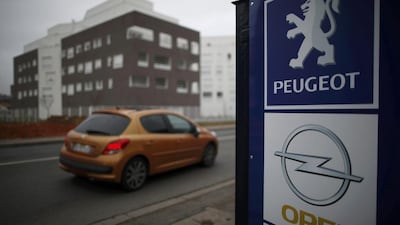The French car maker PSA, which owns the Peugeot and Citroen brands, said on Thursday net profit for 2016 nearly doubled as the group pushes plans to buy General Motors’ European brands Opel and the UK-based Vauxhall.
Net profit for the full year rose 79 per cent to €2.15 billion (Dh8.33bn) with the car firm pledging to pay shareholder dividends for the first time since 2011 to the tune of €0.48 per share.
If the planned takeover is successful, it would see PSA regaining its position as the second-biggest car manufacturer in Europe after Germany’s Volkswagen group. That position is currently held by rival French car maker Renault.
PSA’s improved profitability comes despite a decline in sales due to the scope of consolidation and foreign exchange effects.
“In an environment characterised by adverse exchange rates, this growth was driven by higher volumes, positive price and mix effects, and lower fixed and production costs,” PSA said.
The company also upped its medium-term objectives for 2016-2018, aiming for an operating margin of more than 4.5 per cent, compared with a previous target of 4 per cent.
The planned takeover of GM’s European brands, which were unveiled last week, has sparked fears in both Germany and Britain that the prospective new owner could cut non-French jobs if the deal goes ahead.
PSA has been active in trying to win backing for the acquisition, with the chief executive Carlos Tavares on Wednesday securing the backing of Germany’s chancellor Angela Merkel and also talking with the British prime minister Theresa May.
Opel operates some 10 factories in Europe spread across six countries and had 35,600 employees at the end of 2015 – 18,250 of them in Germany.
* AFP
business@thenational.ae
Follow The National's Business section on Twitter

